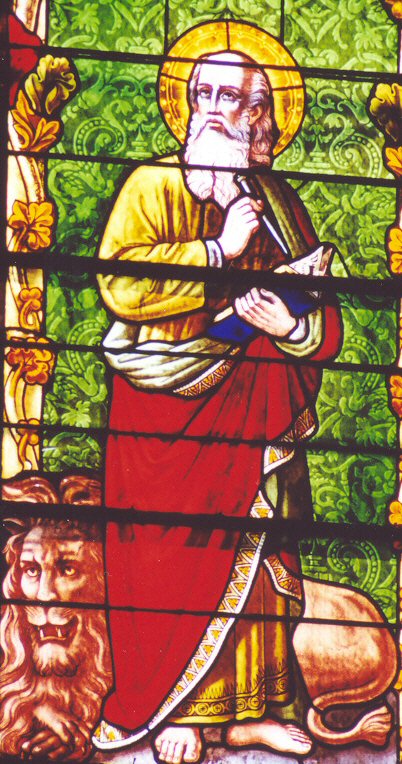Mark 1:40-45
God's Healing Mercy
by Rev. Jack Peterson, YA
Reprinted by permission of "The Arlington Catholic
Herald"
Home Page
To Sunday Gospel Reflections Index
Mark wrote to explain Christ
to the new Gentile converts.
 A
leper came to Jesus and kneeling down begged him and said, "If you wish, you can
make me clean." Moved with pity, he stretched out his hand, touched him,
and said to him, "I do will it. Be made clean." The leprosy left him
immediately, and he was made clean. Then, warning him sternly, he
dismissed him at once.
A
leper came to Jesus and kneeling down begged him and said, "If you wish, you can
make me clean." Moved with pity, he stretched out his hand, touched him,
and said to him, "I do will it. Be made clean." The leprosy left him
immediately, and he was made clean. Then, warning him sternly, he
dismissed him at once.
He
said to him, "See that you tell no one anything, but go, show yourself to the
priest and offer for your cleansing what Moses prescribed; that will be proof
for them."
The
man went away and began to publicize the whole matter. He spread the
report abroad so that it was impossible for Jesus to enter a town openly.
He remained out-side in deserted places, and people kept coming to him from
everywhere.
Few
things were more repugnant in Jesus’ day than leprosy. There was no cure. It was
contagious. Caused by a slow-growing bacteria, leprosy affects the nerves, skin
and eyes. It leads to the crippling of the hands and feet, paralysis and
blindness.
In
addition to the painful and debilitating physical realities, a leper was forced
into becoming a social and religious outcast. A Jew with leprosy had to present
himself to the priest who would declare him unclean. He had to ring a bell when
he ran into people and cry out, “Unclean! Unclean!” Lepers were banished from
society and forced to dwell on the outskirts of town. They also were considered
sinners and were banned from entering the local synagogue or the Temple in
Jerusalem. It could not get much worse.
In
the Gospel today, a leper casts aside these cultural mores and boldly approaches
Jesus in public. He draws near to Jesus, falls to his knees and says: “If you
wish, you can make me clean.” Jesus is moved with pity at the presence of this
suffering soul. He stretches out His hand, touches him and immediately the leper
becomes clean.
The
casting out of demons and the healing of the blind, the lame and others
variously afflicted comprised a major element of Jesus’ ministry. These acts of
Jesus manifest the reality that the kingdom of God has dawned upon the earth.
They are a clear indication of His divinity. They demonstrate Jesus’ power over
Satan, sin and death. These healings proclaim that Jesus came to set humanity
free from captivity to evil. Finally, they also point to a much deeper reality —
Jesus came to heal every human being from the most repugnant disease of all —
sin. Jesus came with a bottomless jar of healing balm, His loving mercy.
We
can’t spend too much time exploring this element of Jesus’ ministry before we
ask the question, why does Jesus not heal physically and immediately every sick
person walking the earth? One outstanding reason is that the suffering that
results from various physical ailments is often the only way that God can break
through our stubborn pride that tempts us to think we are self-made and
self-saved — that we do not need God. Suffering is, for some people, the only
medicine that can heal them of the great sin of believing that they are not
God’s children and are not radically dependent upon Him for life, purpose and
love. Suffering helps us to grasp that we are not Lord of our own lives.
On
a different note, God chooses to allow some of His children to be united
particularly to Jesus by being joined to the suffering He endured during His
public ministry, most especially His passion. When these faith-filled children
intentionally unite their pain and misery to the supreme act of suffering that
Jesus endured in the garden and on the cross, they complete the suffering of
Christ and help Him redeem the world. They choose in love to unite themselves to
the passion of Jesus because love hates to see the beloved suffer and they want
to share His suffering. Many, if not most, of the saints came to this beautiful
level of faith and bore witness that our faith is a profound source of strength
and hope.
The
leper’s response to Jesus’ extraordinary gift of healing is to publicize the
whole miraculous event. You get a sense that he simply could not hold back his
joy. The proper response to God’s healing work in our lives is to proclaim
joyfully His marvels and spend oneself in humble service to God and neighbor.
How
are you responding to God’s healing and mercy in your life today?
Home Page
To Sunday Gospel Reflections Index
 A
leper came to Jesus and kneeling down begged him and said, "If you wish, you can
make me clean." Moved with pity, he stretched out his hand, touched him,
and said to him, "I do will it. Be made clean." The leprosy left him
immediately, and he was made clean. Then, warning him sternly, he
dismissed him at once.
A
leper came to Jesus and kneeling down begged him and said, "If you wish, you can
make me clean." Moved with pity, he stretched out his hand, touched him,
and said to him, "I do will it. Be made clean." The leprosy left him
immediately, and he was made clean. Then, warning him sternly, he
dismissed him at once.